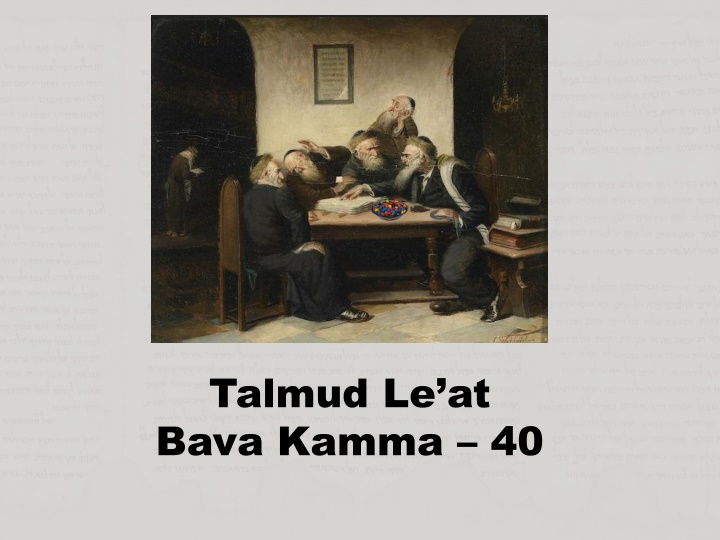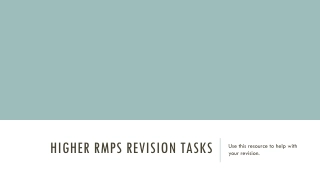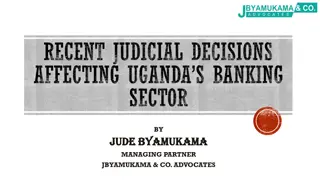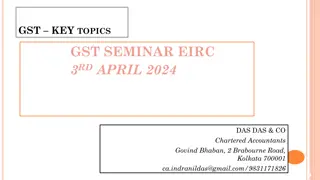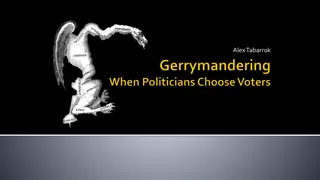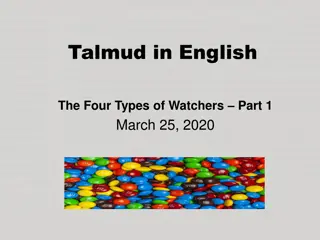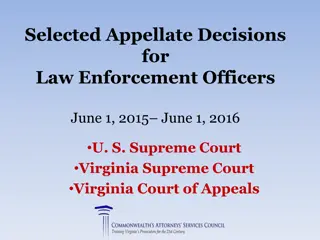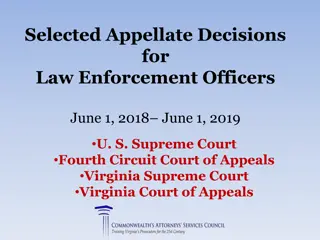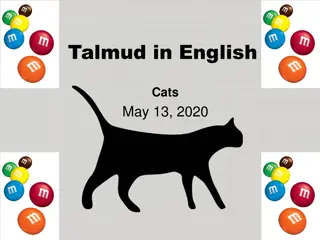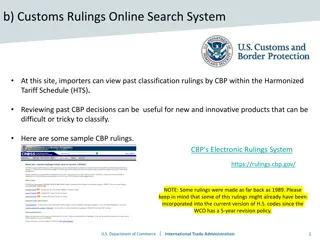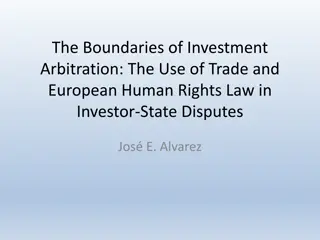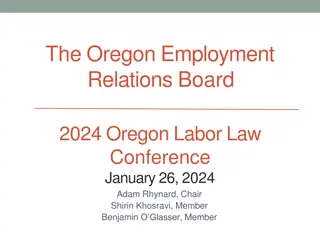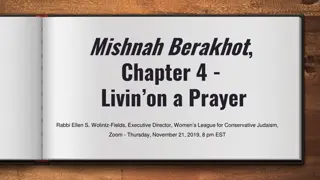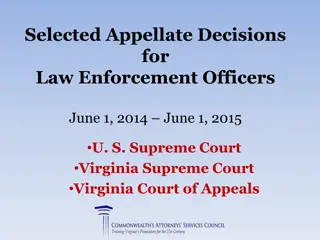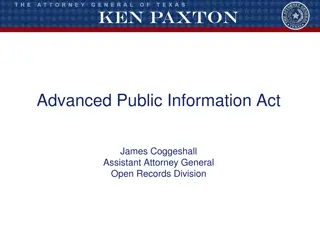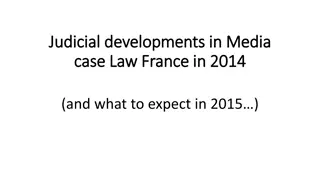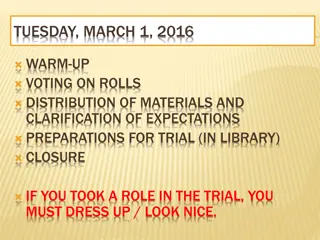Insights on Talmud Mishnah and Bava Kamma Rulings
Delve into ancient legal interpretations on responsibility, liability, and exemptions in mishnah cases related to running in the public domain, with discussions on actions during twilight and the implications of different scenarios. Explore Talmudic perspectives on injuries, permissions, and exemptions.
Download Presentation

Please find below an Image/Link to download the presentation.
The content on the website is provided AS IS for your information and personal use only. It may not be sold, licensed, or shared on other websites without obtaining consent from the author.If you encounter any issues during the download, it is possible that the publisher has removed the file from their server.
You are allowed to download the files provided on this website for personal or commercial use, subject to the condition that they are used lawfully. All files are the property of their respective owners.
The content on the website is provided AS IS for your information and personal use only. It may not be sold, licensed, or shared on other websites without obtaining consent from the author.
E N D
Presentation Transcript
Talmud Leat Bava Kamma 40
Review Potters and Glaziers were walking Who is responsible for an accident? Obligation to stand up Obligation to yell a warning Fallen body = Pit Mishnah 3:5 Jar & Beam Injury during Sex Like a Forest? Cows Walking and Lying 2 Talmud Le'at - 39
Mishnah 3:6 " , , , Two were walking in the public domain, one running and one walking, or both running and they injured one another, both are exempt 3 Talmud Le'at - 40
Bava Kamma 32a ' : : " The mishnah does not follow Issi b. Yehudah For it was taught: Issi b. Yehudah says: the one who runs is liable for he is unusual But Issi b. Yehudah concedes that on erev Shabbat at twilight he is exempt because he is running with permission 4 Talmud Le'at - 40
Bein HaShmashot (Twilight) Shkiah (sink) The moment when the top edge of the sun s disk disappears from view at sea level Bein HaSmashot Tzeit HaKochavim ("stars come out") The time when 3 medium stars are observable in the night time sky with the naked eye 5 Talmud Le'at - 40
Bava Kamma 32a : " ? ' , R. Yohanan says: The halakhah is according to Issi b. Yehudah But did R. Yohanan say this? Did not R. Yohanan say that the halakhah follows the anonymous mishnah? And it was taught: one running and one walking, or both running, exempt ? : 6 Talmud Le'at - 40
Bava Kamma 32a ' ? " ? , " , ? ; , The mishnah refers to erev Shabbat at twilight From where? Since it teaches or both running, they are exempt Why does it need this as well? Now, one running and one walking, exempt; is it necessary both are running? 7 Talmud Le'at - 40
Bava Kamma 32a , : " , " ? , , , ; ' Rather, this is what it says: one is running and one is walking, exempt When is this so? On erev Shabbat at twilight But during the week, one is running and one is walking, liable; both running, even during the week, exempt 8 Talmud Le'at - 40
Bava Kamma 32a " ? : " ' The Master said: And Issi b. Yehudah agrees on erev Shabbat at twilight that he is exempt because he is running with permission What permission is there erev Shabbat? According to R. Hanina 9 Talmud Le'at - 40
Bava Kamma 32a , , : , : ' , As R. Hanina said: Come and let us go out to greet the bride, the queen And some say, to greet Shabbat, the bride, the queen R. Yannai would wrap himself and stand and say: Come my bride, come my bride 10 Talmud Le'at - 40
Mishnah 3:7 " " " , " " " One who was splitting wood in the private domain and injured anyone in the public domain or if he was in the public domain and injured anyone in the private domain or if he was in a private domain and injured anyone in another private domain, he is liable 11 Talmud Le'at - 40
Bava Kamma 32b ! : , " " " " And it is necessary! For if it had taught: One who was splitting wood in the private domain and injured anyone in the public domain because many people are there; but from the public domain to the private domain where not many people are there, one would say not 12 Talmud Le'at - 40
Bava Kamma 32b : " " , " And if it had taught: from the public domain to the private domain because from the outset he is doing something with no permission But from the private domain to the public domain, where he does have permission, one would say not 13 Talmud Le'at - 40
Bava Kamma 32b , " , " ! And if it had taught these two, it is because that many people are there and that he acted without permission But from one private domain to another private domain, where not many people are there and from the outset he acted with permission, one might have said he is not It is necessary! 14 Talmud Le'at - 40
Bava Kamma 32b " : , , Our rabbis taught: One who enters a carpenter s workshop without permission, and a woodchip flies off and hits him in the face and kills him, exempt But if he entered with permission, he is liable 15 Talmud Le'at - 40
Bava Kamma 32b ? " , : ' Liable for what? R. Yose bar Hanina said: He is liable for the four things, but exempt from exile, for this is not similar to the forest Forest, this one goes into his own domain and this one goes into his own domain This one goes into his fellow s domain 16 Talmud Le'at - 40
Bava Kamma 32b : , " ; , ? Rava said: kal vehomer If forest, this one enters of his own accord and this one enters of his own accord; it is treated as if he enters with the other person s consent, and is exiled This, where one entered with the other person s consent, all the more so? 17 Talmud Le'at - 40
Bava Kamma 32b ? : Rather, Rava said: Why is he exempt from exile? Exile is not sufficient And R. Yose bar Hanina s reasoning is because it is unintentional that is close to intentional 18 Talmud Le'at - 40
Talmudic Terminology (Unintentional) (Unintentional bordering on Intentional) (Intentional) 19 Talmud Le'at - 40
Bava Kamma 32b , : , , Rava objected: If he adds one lash and he dies, he is exiled because of him But here, it is unintentional close to intentional, for he should have known that a person could die from one lash, and it teaches that he goes into exile 20 Talmud Le'at - 40
Bava Kamma 32b : : ? ? R. Shimi of Nehardea said: He made a mistake in the count. Rava hit him with his sandal and said to him: Does he count? But was it not taught: The greatest of the judges calls out and the second one counts and the third says, Strike him ? Rather, R. Shimi of Nehardea said: The judge himself miscounted : : 21 Talmud Le'at - 40
Bava Kamma 32b , : , , " " An objection was raised: One who throws a stone into the public domain and kills someone, he goes into exile But here, it is unintentional close to intentional, for he should have known that many people are in the public domain, and it teaches that he goes into exile 22 Talmud Le'at - 40
Bava Kamma 32b : R. Shmuel bar Yitzchak said: where he tore down his wall He should have paid attention He tore it down at night Even at night he should have paid attention 23 Talmud Le'at - 40
Bava Kamma 32b " ? , , He was tearing down his wall during the day into a garbage dump What are the circumstances of the garbage dump? If many people are there, it is intentional And if many people are not there, then it is unintentional 24 Talmud Le'at - 40
Bava Kamma 32b : [ ] R. Papa said: This was necessary only where the garbage dump was used to relieve them at night but not to relieve them during the day, but there are those who chance by and sit It is not intentional for it is not used to relieve them during the day It is not unintentional as there are those who chance by and sit 25 Talmud Le'at - 40
Bava Kamma 32b : R. Papa in the name of Rava taught it about the first clause: One who enters a carpenter s workshop without permission, and a woodchip flies off and hits him in the face and kills him, exempt R. Yose b. Hanina said: He is liable for the four payments but exempt from exile : 26 Talmud Le'at - 40
Bava Kamma 32b " , The one who taught it about the second clause would all the more so in the first clause But the one who taught it about the first clause But about the second clause, since with permission, he is liable for exile 27 Talmud Le'at - 40
Bava Kamma 32b ? : , , But is he liable for exile? Was it not taught: One who enters a smith s workshop and sparks fly out and strike him on the face and he dies, exempt, even if he enters with permission 28 Talmud Le'at - 40
Bava Kamma 32b ? ? ? What are we dealing with here? With the smith s apprentice Does the smith s apprentice stand to be killed? When his master was urging him to go out and he did not go out And just because his master is urging him to go out and he does not, he stands to be killed? He thought he had gone out 29 Talmud Le'at - 40
Bava Kamma 32b ? , ; If so, the same should be true for anyone? Others are not afraid of the master; he is afraid of his master 30 Talmud Le'at - 40
Bava Kamma 33a " " : : " Rav Zevid taught in the name of Rava that this is in reference to this: "and finds" to exclude one who introduces himself From here Rabbi Eliezer ben Ya akov says: one whom a stone departed from his hand, and another stuck out his head and received, exempt Rabbi Yose bar anina says: He is exempt from exile and liable for the four payments " 31 Talmud Le'at - 40
Bava Kamma 33a " , The one who teaches this in reference to this, all the more so in reference to the first But the one who teaches it with regard to the first But in this, entirely exempt 32 Talmud Le'at - 40
